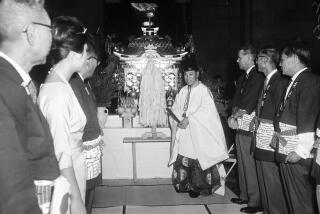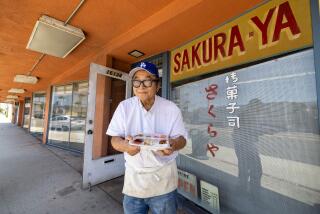Siblings Will Return WWII Japanese Flag : Goodwill: A county deputy public defender and his brother hope the return of the 1945 memento to a dead soldierâs family will help ease tension between the two countries.
LA HABRA â Back when they were small, the Japanese flag that brothers Nicholas and Peter Thompson borrowed from their fatherâs chest of World War II memorabilia was the perfect prop for childhood war games.
Now, the flag will have another purpose.
Nicholas S. Thompson, now 35 and an Orange County deputy public defender, hopes that it will bridge relations with a Japanese family and help ease tension between the United States and Japan.
âFrom time to time we would take it out and play with it. We thought it was a military unitâs flag and that the writing on it said something like, âYankee Dog,â or other terms. We didnât know it had sentimental value to someone,â Thompson said.
Today, 47 years after the flag was taken from a dead Japanese soldier by American sailors in the Lingayen Gulf in the Philippines, both brothers will fly to Japan to return the flag to relatives of Sgt. Shinichi Ishijima. The soldierâs family had given him the flag, signed by relatives and friends, as he went to war.
âWe never knew what the writing meant, so I had a friend translate it, and itâs mostly a lot of well wishes from Shinichiâs friends, Peter Thompson said.
After learning that Shinichiâs name was on it, Peter Thompson, an investment banker with the Japanese-owned Union Bank in Los Angeles, sent a picture of it to a friend in Tokyo. The photograph was published in a Japanese newspaper and several people, including the dead soldierâs former fiancee and his younger brother, came forward.
Kikujiro Ishijima said recently from Nagasaki, Japan, that the silk flag is the familyâs only memento of his dead brother.
âWe will protect it along with the other things from our ancestors. I am very grateful,â he said.
Ishijima, 72 and a retired architect, said relatives had no knowledge of the flagâs existence until a friend in Tokyo saw the newspaper article and contacted him.
The last he saw of his brother, Shinichi, was in 1938 when Kikujiro was also drafted and sent to China. He returned to Nagasaki, but by that time, Shinichi was in Tokyo, headed to the Philippines.
âWe were only told that he died. There were no details,â Ishijima said.
Ishijimaâs family said the flag was not for luck, but a prayer, an expression of patriotism.
According to the Thompson brothersâ father, Cochran Thompson, 72, who is a retired high school history teacher, the flag, which is about 2 feet by 3 feet, is typical of many given to Japanese soldiers as they left home for the army during World War II. The flags were inscribed with good luck wishes and worn about the waist.
The elder Thompson, who was aboard the Amycus, a naval repair ship, was given the flag by sailors.
Sadayashi Fujii, 76, a retired businessman in Garden Grove, who was born in Seattle but grew up in Japan, said the wearing of the flag was similar to sen nin bari, a Japanese custom of having 1,000 friends each sew a stitch on a symbolic cloth of protection worn inside a soldierâs uniform.
âIt was supposed to stop bullets from going through, and Japanese soldiers would wear the cloth around their chest or waist,â Fujii said.
Cochran Thompson said he hopes the flag will help Ishijimaâs family understand the sacrifice the young soldier made in 1945.
âThey can take this back and show it to their kids,â he said. âTheyâll get an idea of how their ancestors died . . . that they died for their country. I think itâs good to keep those traditions alive.â
The Thompson brothersâ trip to Japan is intended as both a humanitarian gesture to Ishijimaâs family and an act of good will to ease tensions between the United States and Japan, Peter Thompson said.
âWe could have sent this by mail. In fact, that was suggested by the Japanese, who were surprised when we told them: âNo. This flag has been a significant memento in our family and we intend to deliver it in person.â â
âWe feel that with all the Japan-bashing, itâs important for the Ishijima family to know weâre one American family who cares,â said brother Peter, who spent two years working for the Bank of Tokyo in Japan. âWhatâs really ironic is that my dad fought the Japanese, and here I am working for them.â
Ishijima, who said their home in Nagasaki âdidnât burnâ when U.S. pilots dropped the atomic bomb, hopes the exchange will calm relations between the United States and Japan.
âWe hated each other during the war and we fought,â he said. But now that thereâs peace. . . . We have to get along as human beings, isnât that the best thing now?â
Times staff writer Sonni Efron contributed to this story.
More to Read
Sign up for Essential California
The most important California stories and recommendations in your inbox every morning.
You may occasionally receive promotional content from the Los Angeles Times.










